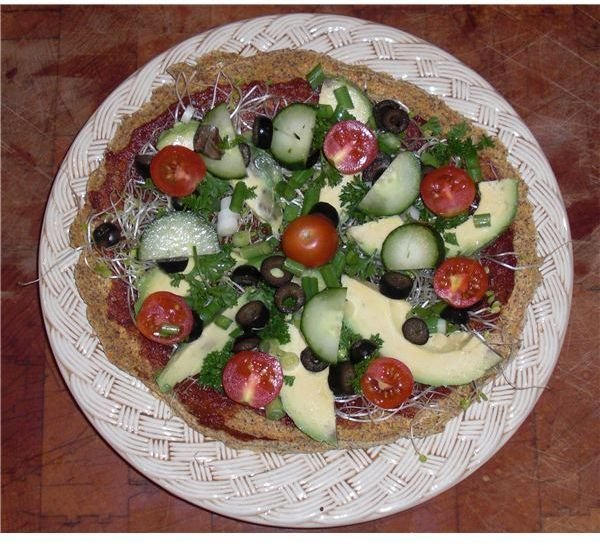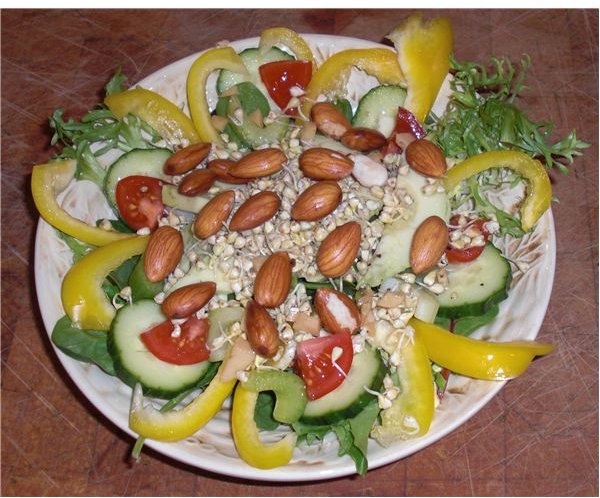The Different Types of Enzymes: Find Out Why We Need To Eat Enzyme Rich Foods to Stay Young, Healthy and Cancer Free
The Definition of Enzymes
Imagine journeying to the fountain of youth. Just take a dip, and poof, your cancer is gone and you are young and healthy again. This is obviously a far fetched idea and is not within the realm of reality. But what if I told you that you could begin becoming younger and healthier today. Would you do it? Well, I have great news! You can.
Eating food that is full of enzymes will do just that. It will make you younger and healthier and help you to prevent and fight cancer and other sicknesses. Enzymes are necessary for life. They are involved in every process of the body that is necessary to sustain life. Without enzymes, there is no life.
There are two different types of enzymes – metabolic and digestive.
The definition of enzymes:
“Enzymes are complex proteins that cause a specific chemical change in other substances, without being changed themselves. For example they can change starches, proteins and sugars into substances the body can use. Blood clotting is another example of enzymes at work.“1
“Enzymes are essential to all bodily functions. They are found in the mouth (saliva), stomach (gastric juice), intestines (pancreatic juice, intestinal juice and intestinal mucosa), blood and every other organ and cell in the body.“2
The role of digestive enzymes is to assist the body in the breaking down of foods. It is commonly believed that every person is born with a store of digestive enzymes to last their lifetime. Metabolic enzymes play a very important role in fighting disease and assisting the immune system. If we do not eat foods that contain enzymes, our body must take from its own store of them in order to digest our foods. This activity causes the body to take its focus off of replenishing its store of metabolic enzymes that are constantly being used in all cellular, tissue and organ functions of the body. It is very important to eat foods that contain enzymes so that we are adding enzymes to our bodies instead of depleting our bodies of enzymes.
As you can easily see, the two different types of enzymes play very important roles in the health of the body.
What Foods Contain Enzymes?
Enzymes are destroyed at temperatures above 129 degrees. We have a choice to either eat live, uncooked food which is full of enzymes, or we eat cooked, “dead” food which requires the body to use its own store of enzymes in order to be digested. Enzyme rich foods include sprouted nuts, seeds and grains, fresh fruits and vegetables and raw dairy products. If we are mostly choosing to eat our food in a cooked state, we are using up our body’s stores of enzymes in order to digest our food. These enzymes that we are using to digest our food would otherwise be doing their jobs of being involved in such metabolic processes as fixing things that are going wrong in our bodily systems like fighting off disease, ridding the body of toxins, breaking down tumors, blood clotting, etc…
As we age, our enzyme stores become depleted and if we are eating dead food that requires the use of our enzyme stores in order to be digested, then our bodies end up with a shortage of metabolic enzymes. The end result is a breakdown of the body, and hence disease and pre-mature aging. It is only common sense that if enzymes are necessary for life, a shortage of enzymes will cause a shortage of life!! The more help we offer to our bodies in the form of eating enzyme rich foods, the less taxing it will be for our bodies to function and keep us disease free and youthful.
Enzymes are proven to assist the body in the war on cancer. According to Marilyn Bitomsky, author of “Digestive Enzymes, the Missing Link”, in Life Extension Magazine, “For a good part of the 20th Century, European oncologists have included enzyme therapy as a natural, non-toxic therapy against cancer. Almost all of the leading alternative cancer specialists treating Americans prescribe both food enzymes and concentrated enzyme supplements as primary or adjunct cancer therapies. Nicholas Gonzalez, M.D., a New York City cancer specialist, uses very high doses of supplemental pancreas enzymes as a primary anti-tumor therapy.”
If cooked foods are void of enzymes, then adding more raw or “live” foods to our diets is a way to greatly multiply our enzyme intake. Adding a high quality enzyme supplements to our meals and taking them with our vitamins is another way to ingest extra enzymes. Taking an enzyme supplement will enable the body to absorb more nutrients from food and from vitamins. Sprouted foods happen to have a significantly higher amount of enzymes than even unsprouted raw foods do. Sprouting is an economical and easy way to add a large amount of nutrition to your diet. To learn more about the many benefits of sprouting and how to grow your own sprouts, click here.
A great lunch to eat that is full of live enzymes is a big organic green salad with a bountiful array of colorful vegetables added in. Top this with some alfalfa or broccoli sprouts and add some raw almonds that have been soaked overnight in pure water. (Rinse them before eating!) Scoop out half an avocado and drizzle with a dressing made of cold pressed olive oil, raw apple cider vinegar, sea salt and freshly ground pepper. Chop up a clove of garlic to throw on top and you have enzymes galore!!
Enzymes are a necessary part of the diet for those who would like to live a disease free, youthful and energetic life.
Sprout Rich Foods to Tantalize Your Taste Buds
Enjoy and enzyme rich salad meal.
Tempt your palate with a raw pizza with sprouted grain, dehydrated crust and raw pizza sauce and lots of delicious veggies.

For more information on making amazing raw foods, check out Alissa Cohen’s book, Living on Live Food and Juliano’s book, Raw.
References
1. Medline Plus, a service of the U.S. National Library of Medicine and the National Institutes of Health, Encyclopedia https://www.nlm.nih.gov/medlineplus/ency/article/002353.htm
2. Ibid
Disclaimer
Please read this disclaimer regarding the information you have just read.
